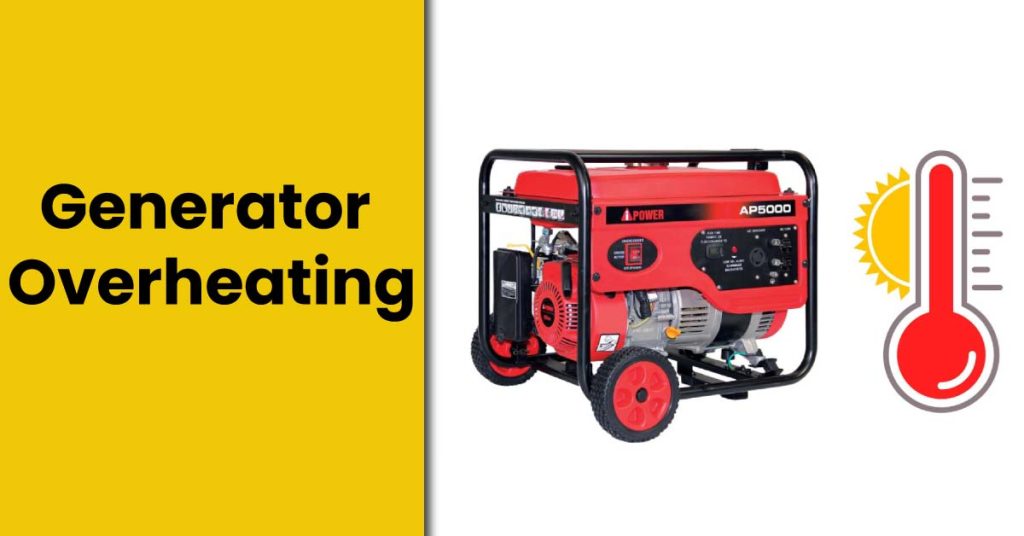Generator Overheating – Common Causes, Problems, & Solutions
In this article, I have addressed the common causes, problems, and solutions of generator overheating whether it is a portable or large diesel generator.
Most modern portable generators come with an overload alarm, low-oil shutoff, and temperature gauges to monitor overloading and overheating to prevent internal damage.
But,
There are a ton of generators available in the market without the above-mentioned features, especially the large standby whole-house generators.
Overheating is one of the main causes of generator failure. It can save you downtime and repair costs if you can avoid it. Generating overheating can be triggered by a lot of things, but most can be corrected before permanent damage.
Firstly, we will discuss why overheating is dangerous for generators. Secondly, we will look at the main causes/problems that cause overheating. Lastly, we will discuss how to avoid overheating.
Why Overheating Is Dangerous For Generators

Excessive overheating can cause the alternator to overheat as well resulting in weakening and damaging of the internal insulation. If this goes on without noticing, it may catch fire. The voltage regulator is often the first component to fail.
What Causes A Portable Generator To Overheat?
Blocked Exhaust:
Due to snow, dust, debris, and birds’ nest, the exhaust can be blocked. It could cause severe overheating. Always check the exhaust pipe before starting your generator.
Check out my article on how to safely run a generator in a garage as well.
Dry Oil Filter:
Clogged and dusty air filter becomes dry resulting in the blockage of air. The carburetor will not receive any airflow for the combustion.
Even if it starts, the internal friction caused by the low oil can cause overheating resulting in the damage of pistons, valves, and chambers.
Always clean the air filter on a regular basis, and check the gasket and clamps to ensure there are no leaks.
Checkout our guide about the maintenance of generator
Overload:
Suppose your generator has 2500 starting watts and 1800 running watts. If you are using a total load of exactly or above 1800 running watts, the overload alarm will go OFF. The alarm will either automatically shut down the generator, or you will have to do it manually.
If your generator doesn’t have an overload alarm, and you are constantly pushing your portable to the limit for hours and hours, the electrical overload could cause massive overheating, damage to the engine, or back feed the power. The connected appliances could receive a surge back into them.
Electrical overload is only harmful to the generator but to the connected appliances as well.
External Heat:
If your generator is stored or placed outside under the sunlight, or even in the shade, the summer sunlight can whoop your generator’s ass.
Where I live, the temperature scale goes as high as 125.6F. That much external heat can cause the metal to massively overheat and forget about starting it outside. Otherwise, it might catch fire.
Create some sort of shelter to protect the metal from the sun’s rays. Oil-driven machines can catch fire in the summer.
Check The Oil Levels:
If your portable generator doesn’t have a low-oil shutdown feature, then you will need to be careful and change the oil on time (as described in the manual).
If you are just a clumsy person like me and forgot to change the oil, the generator engine will gradually eat up the oil and make it thicker and darker resulting in internal friction.
The internal friction leads to massive overheating. The mechanism can either malfunction or break apart. So be careful.
Checkout our guide about why Generator Won’t Start
Can I Splash Water On My Overheated Generator?
No. water and generator are not friends. It may not only cause rusting, but the risk of electrocution is also high. Moisture can find its way inside the generator.
How To Prevent Portable Generator Overheating:
Diesel Generator Overheating Causes
Massive diesel generators are often known for their efficiency, durability, lifespan, and reliability, but overheating is a general problem in all types of generators.
Diesel generators have similar reasons for overheating like portable units, but diesel units have additional parts that can be affected as well.
Check out our guide about How To Polarize A Generator
Diesel Generator Overheating Causes Are Mentioned Below:
How To Avoid Diesel Generator Overheating:
Frequently Asked Questions
How do I know if my portable generator is overheating?
Overheated generators make a loud noise, and vibrations, and radiate immense heat. Often they provide a sudden surge in power output as well. Most units have a temperature sensor or gauge to measure overheating.
What do I do if my generator is overheated?
First of all, don’t splash water on it. Turn it off. Let it cool for a minute or so. Check the oil level, make sure there is enough air circulation, nothing is blocking the exhaust pipe, the air filter is not dry, and there is no debris or dirt in the carburetor.
How do I prevent my generator from overheating?
Regular cleaning of the air filter, changing the oil on time, proper ventilation for the generator to operate, never leaving it under the sun or using it under the sunlight, checking for leaks, and make there is no obstruction to airflow or exhaust.

Alex Black is a seasoned electrical engineer with a remarkable 8-year track record specializing in appliances, generators, and transfer switches. With extensive hands-on experience in the field, Alex possesses a deep understanding of electrical systems and their intricate workings. Throughout their career, Alex has consistently demonstrated expertise in designing, troubleshooting, and maintaining various electrical appliances.
